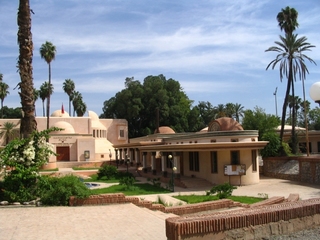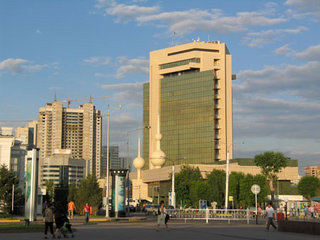OPEC Planning to Maintain Oil Quotas as U.S. Winter Nears
Published:
24 September 2003 y., Wednesday
OPEC, supplier of a third of the world's oil, is planning to maintain output quotas through the end of the year as sabotage limits Iraqi exports and demand rises because of winter from the U.S. to Japan, officials said.
The group meets today in Vienna. Ministers from Saudi Arabia, Iran, Kuwait, the United Arab Emirates, Algeria, Venezuela and Indonesia have signaled no change is needed because prices are within their target of $22 to $28 a barrel.
``OPEC has no immediate need to act,'' said Chris Brown, director of energy consulting at Wood Mackenzie Consultants Ltd. in London. ``We could see a cut in the next two months depending on how more Iraqi oil comes on line. The last thing OPEC wants is a glut forming.''
Crude oil in London has averaged $28.29 a barrel in 2003, $10 more than the 1990s average, boosting income within the Organization of Petroleum Exporting Countries and profit at oil companies such as BP and Exxon Mobil Corp. Prices may fall in 2004 as Iraqi exports and rising output in Russia overwhelm demand, according to a Bloomberg News survey.
Iraqi Oil Minister Ibrahim Mohammad Bahr al-Ulum traveled to Vienna for the gathering, where Venezuela objected to the country's participation in the formal meeting. The minister was appointed with the help of the U.S.-led authority in Baghdad, and Iraq's interim government has yet to be recognized by the United Nations.
Concern is mounting among ministers that prices will decline in 2004, and Algerian and Kuwaiti officials said OPEC may have to assemble again in December. Oil prices have dropped 15 percent in the past month for OPEC's benchmark, to $24.82 a barrel.
Šaltinis:
Bloomberg
Copying, publishing, announcing any information from the News.lt portal without written permission of News.lt editorial office is prohibited.
The most popular articles
 On 11 February, heads of state or government of European Union member states will meet in Brussels to seek a commitment towards implementing a revitalised economic strategy to boost employment and growth in the EU.
more »
On 11 February, heads of state or government of European Union member states will meet in Brussels to seek a commitment towards implementing a revitalised economic strategy to boost employment and growth in the EU.
more »
 International Monetary Fund forecasts that Lithuania’s economy will grow 1.6 % this year, making it “the only one of the three Baltic economies expected to be in the positive territory in 2010”.
more »
International Monetary Fund forecasts that Lithuania’s economy will grow 1.6 % this year, making it “the only one of the three Baltic economies expected to be in the positive territory in 2010”.
more »
 Raynair announced it would open its 40th and 1st Central European base at Kaunas, Lithuania’s second largest city, in May with 2 based aircraft and 18 routes.
more »
Raynair announced it would open its 40th and 1st Central European base at Kaunas, Lithuania’s second largest city, in May with 2 based aircraft and 18 routes.
more »
 A new Partnership Strategy for Morocco has been approved by the Board of Executive Directors of the World Bank.
more »
A new Partnership Strategy for Morocco has been approved by the Board of Executive Directors of the World Bank.
more »
 The electric car is an opportunity for European industry.
more »
The electric car is an opportunity for European industry.
more »
 The EBRD’s Board of Directors has adopted a new strategy for Kazakhstan, which reinforces the Bank’s commitment to further support the Kazakh economy and sets out the priorities for its activities in the country over the next three years.
more »
The EBRD’s Board of Directors has adopted a new strategy for Kazakhstan, which reinforces the Bank’s commitment to further support the Kazakh economy and sets out the priorities for its activities in the country over the next three years.
more »
 The European Commission has authorised, under EU state aid rules, plans notified by Sweden to provide a guarantee that would enable Saab Automobile AB to access a loan from the European Investment Bank (EIB).
more »
The European Commission has authorised, under EU state aid rules, plans notified by Sweden to provide a guarantee that would enable Saab Automobile AB to access a loan from the European Investment Bank (EIB).
more »
 At the informal meeting of the Ministers of Competitiveness (Science and Industry), to be held between 7 and 9 February in San Sebastian, the issues on the table will include placing science at the top of the EU agenda and showcasing its role in economic recovery, as well taking the debate on the electric vehicle to EU level.
more »
At the informal meeting of the Ministers of Competitiveness (Science and Industry), to be held between 7 and 9 February in San Sebastian, the issues on the table will include placing science at the top of the EU agenda and showcasing its role in economic recovery, as well taking the debate on the electric vehicle to EU level.
more »
 The Executive Board of the International Monetary Fund (IMF) today approved a 27-month Stand-By Arrangement with Jamaica in the amount of SDR 820.5 million (about US$1.27 billion) to support the country’s economic reforms and help it cope with the consequences of the global downturn.
more »
The Executive Board of the International Monetary Fund (IMF) today approved a 27-month Stand-By Arrangement with Jamaica in the amount of SDR 820.5 million (about US$1.27 billion) to support the country’s economic reforms and help it cope with the consequences of the global downturn.
more »
 Mr. Nadeem Ilahi, chief of an International Monetary Fund (IMF) staff mission to the Kyrgyz Republic, issued the following statement today in Bishkek.
more »
Mr. Nadeem Ilahi, chief of an International Monetary Fund (IMF) staff mission to the Kyrgyz Republic, issued the following statement today in Bishkek.
more »